Learning data skills often involves a tradeoff: either pay for an expensive bootcamp or rely on free tutorials that seldom cover how real systems are built.
DataTalks.Club takes a different approach. We run free, fully developed courses, called zoomcamps, designed around building production-grade projects from the ground up. Instead of isolated lessons, you work through complete workflows using the same tools and processes practitioners use every day.
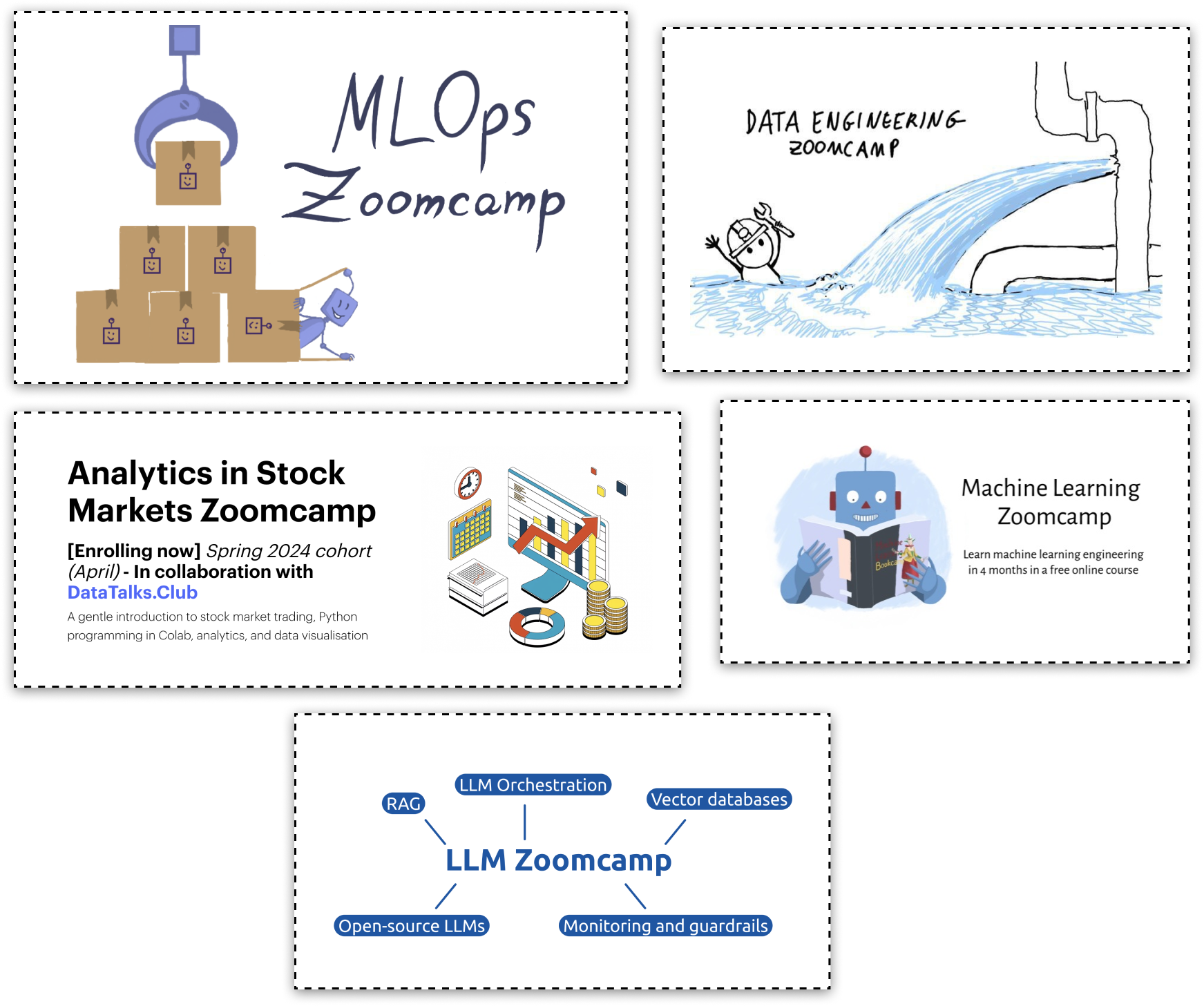
Overview of all six free DataTalks.Club zoomcamp courses: Machine Learning, Data Engineering, MLOps, LLM, AI Dev Tools, and Stock Market Analytics
We currently have six free courses:
- Machine Learning Zoomcamp on end-to-end ML engineering, from training models to packaging, testing, and deployment
- Data Engineering Zoomcamp on data engineering, covering aspects like pipelines, warehouses, orchestration, and analytics infrastructure
- MLOps Zoomcamp on MLOps or ML operations that involve monitoring, automation, and operationalizing ML models and systems in production
- LLM Zoomcamp on building AI applications with large language models (LLMs), combining them with RAG and using them to build AI agents
- AI Dev Tools Zoomcamp on using AI tools like AI chatbots, IDE integrations, and AI agents to accelerate the processes that involve working with code
- Stock Market Analytics Zoomcamp on stock market trading, Python programming in Colab, analytics, and data visualisation.
Across all zoomcamps you work with practical tooling like Python, Docker, cloud services, modern frameworks, and deliver portfolio-ready projects.
You can join live cohorts with weekly deadlines, scored homework, peer-reviewed projects, and a certificate, or learn independently at any time. All materials remain freely available, supported by an active global community of thousands of learners.
In the next sections, you’ll find detailed overviews of each course, including prerequisites, structure, tools, and projects.
DataTalks.Club Free Courses Table
Here’s a table that summarizes the key information about each course. Use it to overview all courses and navigate to the course you’re interested in.
| Course | Level | Prerequisites | Key Topics | Tools/Tech Stack | What You'll Build |
|---|---|---|---|---|---|
| Machine Learning Zoomcamp | Beginner to Intermediate | 1+ year programming experience, command line basics | Regression, classification, trees, neural nets, deployment | Python, NumPy, Pandas, Scikit-Learn, TensorFlow, PyTorch, FastAPI, Docker, Kubernetes | Production ML models deployed as web services with Docker & cloud |
| Data Engineering Zoomcamp | Intermediate | Coding skills, command line, basic SQL | Pipelines, warehouses, orchestration, batch & streaming | Docker, Postgres, BigQuery, dbt, Apache Spark, Apache Kafka | Scalable data pipelines processing batch & streaming data |
| MLOps Zoomcamp | Intermediate to Advanced | 1+ year programming, ML exposure, Python, Docker | Experiment tracking, pipelines, deployment, monitoring | MLFlow, FastAPI, AWS, Mage, Evidently AI | Automated ML deployment system with monitoring & alerts |
| LLM Zoomcamp | Intermediate | Python, command line, Docker (no ML required) | LLMs, RAG, vector search, evaluation, production deployment | OpenAI API, LangChain, Hugging Face, Ollama, Qdrant, Elasticsearch | AI chatbot that answers questions from your knowledge base |
| AI Dev Tools Zoomcamp | Beginner to Intermediate | Basic programming (Python/JavaScript), no AI required | AI assistants, agents, MCP, automation, DevOps integration | GitHub Copilot, Cursor, MCP, Django, FastAPI, n8n, React | AI-powered development toolkit with assistants & agents |
| Stock Markets Analytics Zoomcamp | Beginner to Intermediate | Basic Python, analytical mindset, interest in finance | Financial data, modeling, trading strategies, automation | Python, Pandas, NumPy, financial APIs, trading frameworks | Trading system that generates predictions & executes trades |
How DataTalks.Club Zoomcamps Work
Before diving into the individual courses, it’s helpful to understand how the overall learning experience at DataTalks.Club is organized: what the core components are, how zoomcamps are structured, and what you can expect as a learner.
All zoomcamps follow the same core pattern:
- Pre-recorded lectures on YouTube you can watch anytime
- Open-source materials on GitHub, including code, notes, and homework
- Two learning formats: fully self-paced or joining a live cohort
- A final project you can include in your portfolio
Each course is divided into modules. Every module covers one topic, adds a hands-on task, and gradually prepares you for the final project.
The learning materials are identical across formats, but the experience differs:
- In self-paced mode, you start anytime and progress at your own speed.
- In a live cohort, you follow a weekly schedule with deadlines, peer-reviewed projects, and the option to earn a certificate.
Machine Learning Zoomcamp
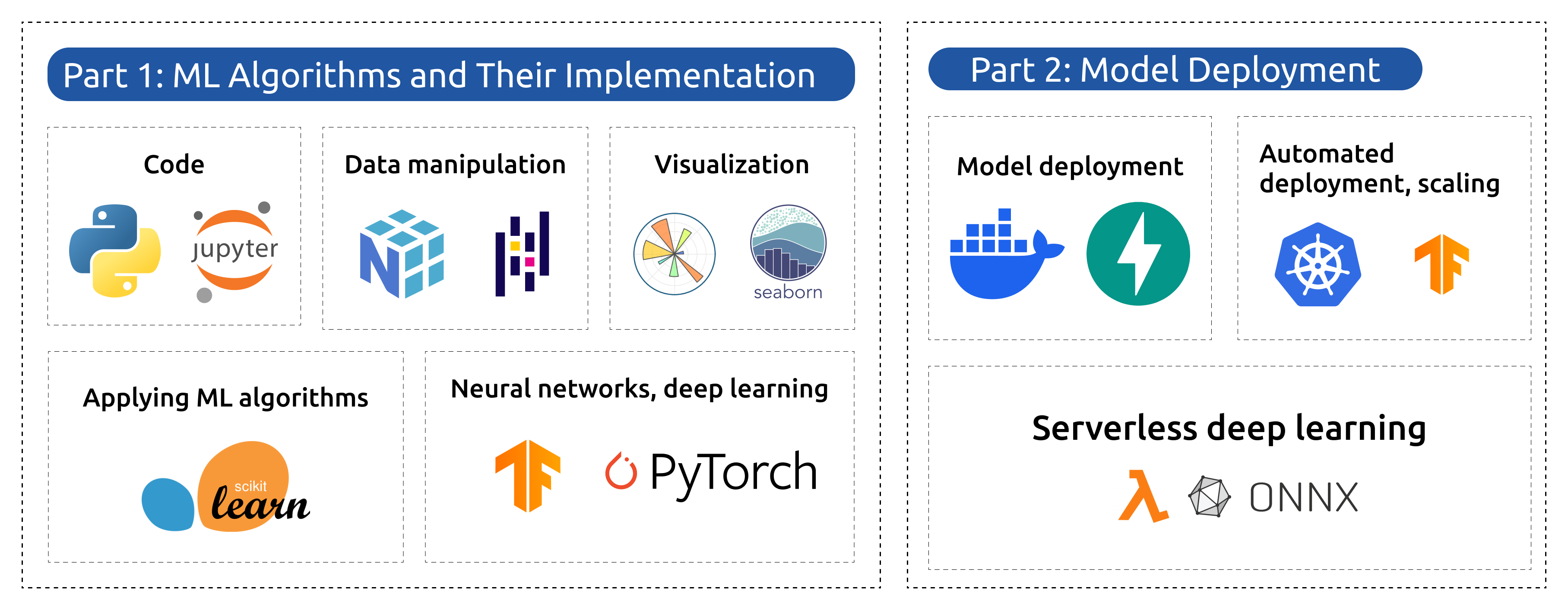
Machine Learning Zoomcamp 2025 curriculum showing the learning progression from foundational ML algorithms (regression, classification, trees, neural networks) using Python, NumPy, Pandas, and Scikit-learn, through deep learning with TensorFlow and PyTorch, to production deployment with Docker, FastAPI, and Kubernetes
| Level | Beginner to Intermediate |
| Duration | 4-month live cohort (September-December) or self-paced anytime |
| Cost | Free |
| Certificate | Yes, after completing projects and peer reviews |
| Prerequisites | 1+ year programming experience, command line basics |
| Key topics covered | Regression, classification, trees, neural nets, deployment |
| Tools/tech stack | Python, NumPy, Pandas, Scikit-Learn, TensorFlow, PyTorch, FastAPI, Docker, Kubernetes |
| Who it's for | Beginners with programming experience, aspiring ML engineers, career switchers, and software engineers who want practical, end-to-end ML experience |
| Projects | Production ML models deployed as web services with Docker & cloud |
| Outcomes | Hands-on experience with the full ML lifecycle and two portfolio-ready projects demonstrating your ability to build, deploy, and operate production ML systems |
| Next start date | New cohort starts every September |
Machine Learning Zoomcamp is a free machine learning course that teaches you to build and deploy machine learning models in production environments. It bridges the gap between training models in notebooks and running them in real-world applications.
You’ll work with industry-standard tools including Scikit-Learn, TensorFlow, and PyTorch, and complete two portfolio-ready projects that demonstrate your ability to build, deploy, and operate production ML systems.
Data Engineering Zoomcamp
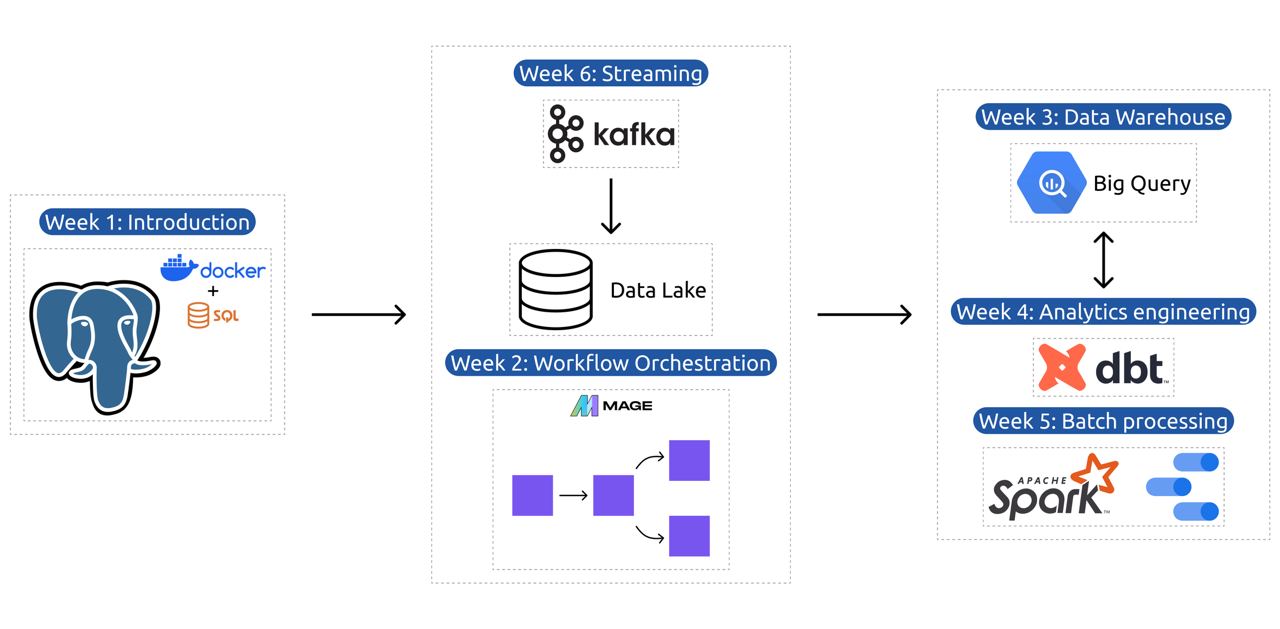
Data Engineering Zoomcamp 2026 9-week curriculum covering infrastructure setup with Docker and Terraform, workflow orchestration, data warehousing with BigQuery, analytics engineering with dbt, batch processing with Apache Spark, and stream processing with Apache Kafka
| Level | Intermediate |
| Duration | 9-week live cohort (January-March) or self-paced anytime |
| Cost | Free |
| Certificate | Yes, after completing a project and peer reviews |
| Prerequisites | Coding skills, command line, basic SQL |
| Key topics covered | Pipelines, warehouses, orchestration, batch & streaming |
| Tools/tech stack | Docker, Postgres, BigQuery, dbt, Apache Spark, Apache Kafka |
| Who it's for | People preparing for junior data engineer roles (including beginners and career switchers), plus experienced professionals who want to refresh their skills and expand their network |
| Projects | A portfolio-ready project demonstrating your ability to build, deploy, and operate end-to-end data systems |
| Outcomes | Hands-on experience with production-grade data pipelines |
| Next start date | New cohort starts every January |
Data Engineering Zoomcamp is a free data engineering course that teaches you how to build production-grade data pipelines from start to finish. It follows a clear progression: infrastructure setup, workflow orchestration, data warehousing, analytics engineering, batch processing, streaming, and a final project.
Throughout the 9-week program, you’ll master essential tools like Docker for containerization, PostgreSQL and BigQuery for data warehousing, dbt for analytics engineering, Apache Spark for batch processing, and Apache Kafka for stream processing. The course culminates in a capstone project where you build an end-to-end data pipeline that demonstrates your ability to design, implement, and operate scalable data systems used in production environments.
MLOps Zoomcamp
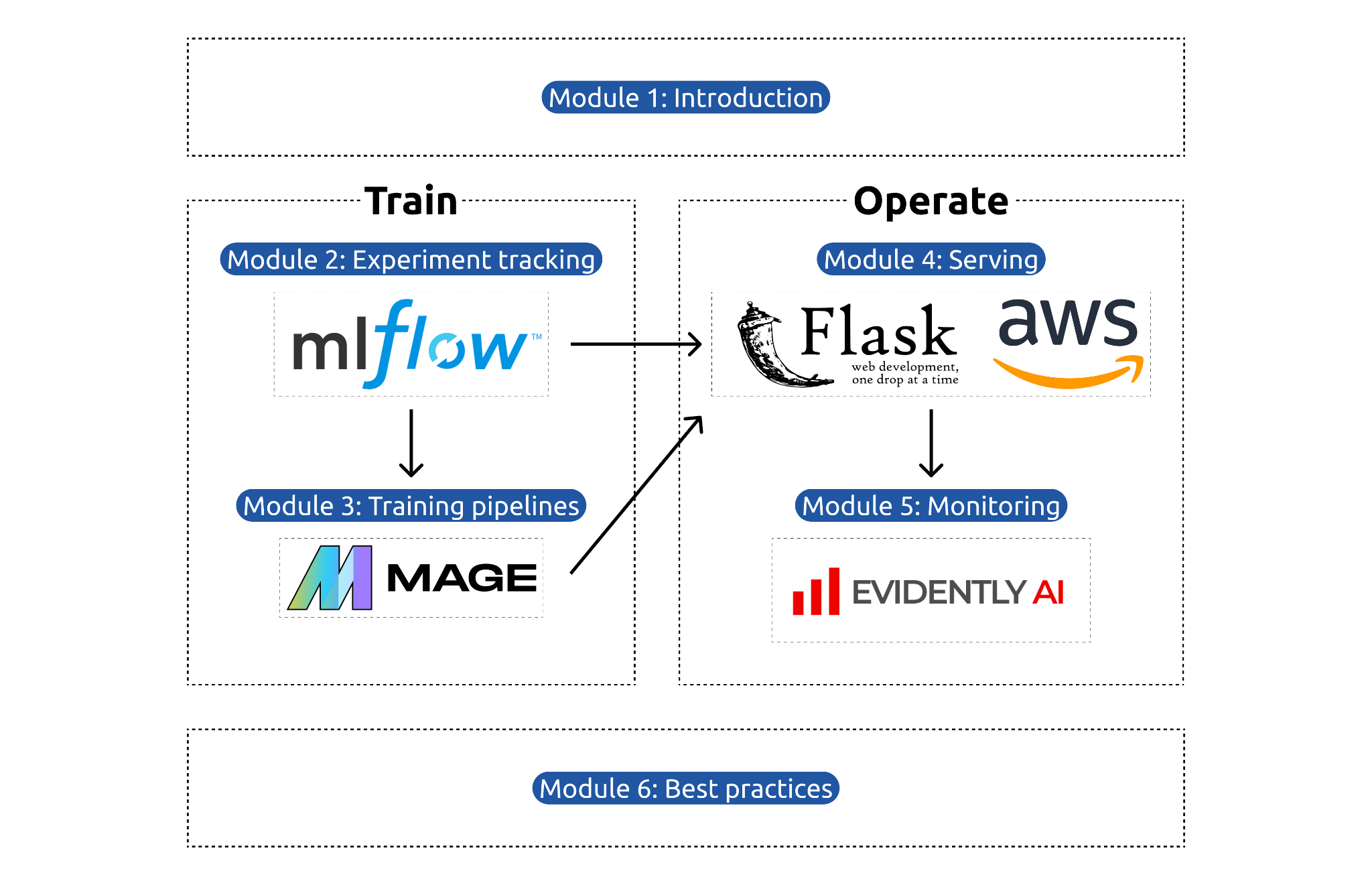
MLOps Zoomcamp course overview illustrating the complete machine learning operations lifecycle: experiment tracking with MLflow, orchestration and ML pipelines with Mage, model deployment with FastAPI and AWS, and production monitoring with Evidently AI
| Level | Intermediate to Advanced |
| Duration | 3-month live cohort or self-paced anytime |
| Cost | Free |
| Certificate | Yes, after completing a project and peer reviews |
| Prerequisites | 1+ year programming, ML exposure, Python, Docker |
| Key topics covered | Experiment tracking, pipelines, deployment, monitoring |
| Tools/tech stack | MLFlow, FastAPI, AWS, Mage, Evidently AI |
| Who it's for | Data scientists, ML engineers, and software developers who are interested in understanding MLOps, the process of putting machine learning code in production |
| Projects | Automated ML deployment system with monitoring & alerts |
| Outcomes | Hands-on experience with the full MLOps lifecycle and a portfolio-ready project demonstrating your ability to build, deploy, and monitor production ML systems |
| Next start date | We don't plan to run a new cohort in 2026. You can register to stay updated if this changes |
MLOps Zoomcamp is a free MLOps course that covers the entire MLOps lifecycle: from experiment tracking and model management to deployment and monitoring. Designed for data scientists and ML engineers, the course teaches you how to operationalize machine learning models at scale.
You’ll learn to use MLflow for experiment tracking, build automated training pipelines with Mage, deploy models using FastAPI and AWS services, and set up comprehensive monitoring with Evidently AI. The course emphasizes best practices for testing, CI/CD integration, and maintaining ML systems in production, preparing you to build and manage reliable ML infrastructure.
LLM Zoomcamp
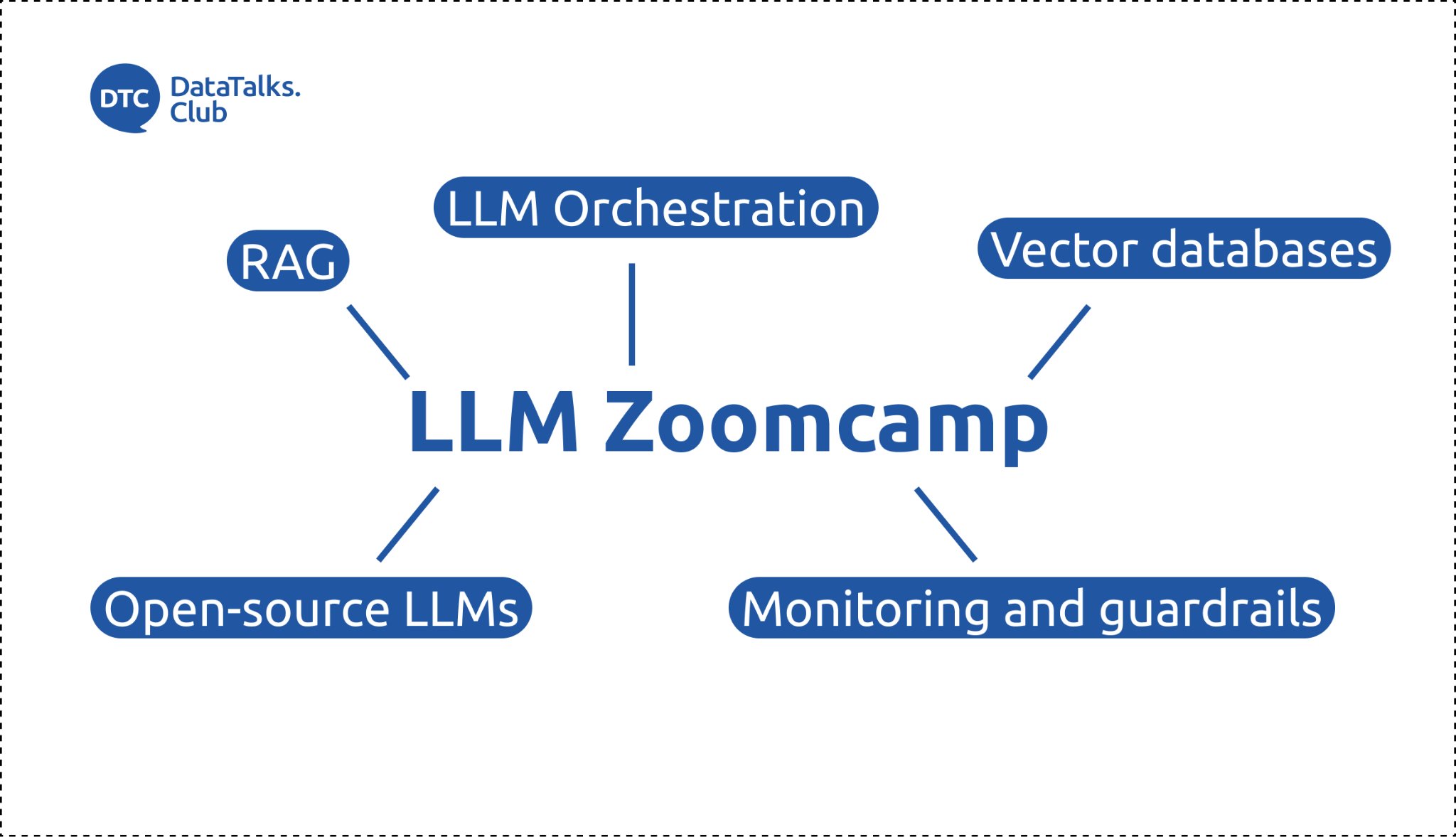
LLM Zoomcamp 10-week program on building AI applications with large language models, covering RAG (retrieval-augmented generation), vector databases, evaluation techniques, and production deployment using OpenAI, LangChain, Hugging Face, and Ollama
| Level | Intermediate |
| Duration | 10-week live cohort (June-August) or self-paced anytime |
| Cost | Free |
| Certificate | Yes, after completing a project and peer reviews |
| Prerequisites | Python, command line, Docker (no ML required) |
| Key topics covered | LLMs, RAG, vector search, evaluation, production deployment |
| Tools/tech stack | OpenAI API, LangChain, Hugging Face, Ollama, Qdrant, Elasticsearch |
| Who it's for | Python developers and software engineers who want to build AI-powered applications with large language models, from beginners to those looking to add LLM skills to their toolkit |
| Projects | AI chatbot that answers questions from your knowledge base |
| Outcomes | Hands-on experience building production-ready RAG applications and a portfolio-ready project demonstrating your ability to create AI systems that interact with custom knowledge bases |
| Next start date | New cohort starts every June |
LLM Zoomcamp is a free course on building AI systems with large language models (LLMs). Over 10 weeks, you learn how to create an AI application that answers questions from your own knowledge base, from foundational concepts and retrieval-augmented generation (RAG) to evaluation, optimization, and production deployment.
The course covers both commercial APIs (OpenAI) and open-source models (Hugging Face, Ollama), teaches vector database integration with Qdrant and Elasticsearch, and shows you how to build production-ready RAG applications using LangChain. You’ll also learn modern agent patterns, evaluation techniques, and how to integrate LLMs with external tools and APIs for real-world applications.
AI Dev Tools Zoomcamp
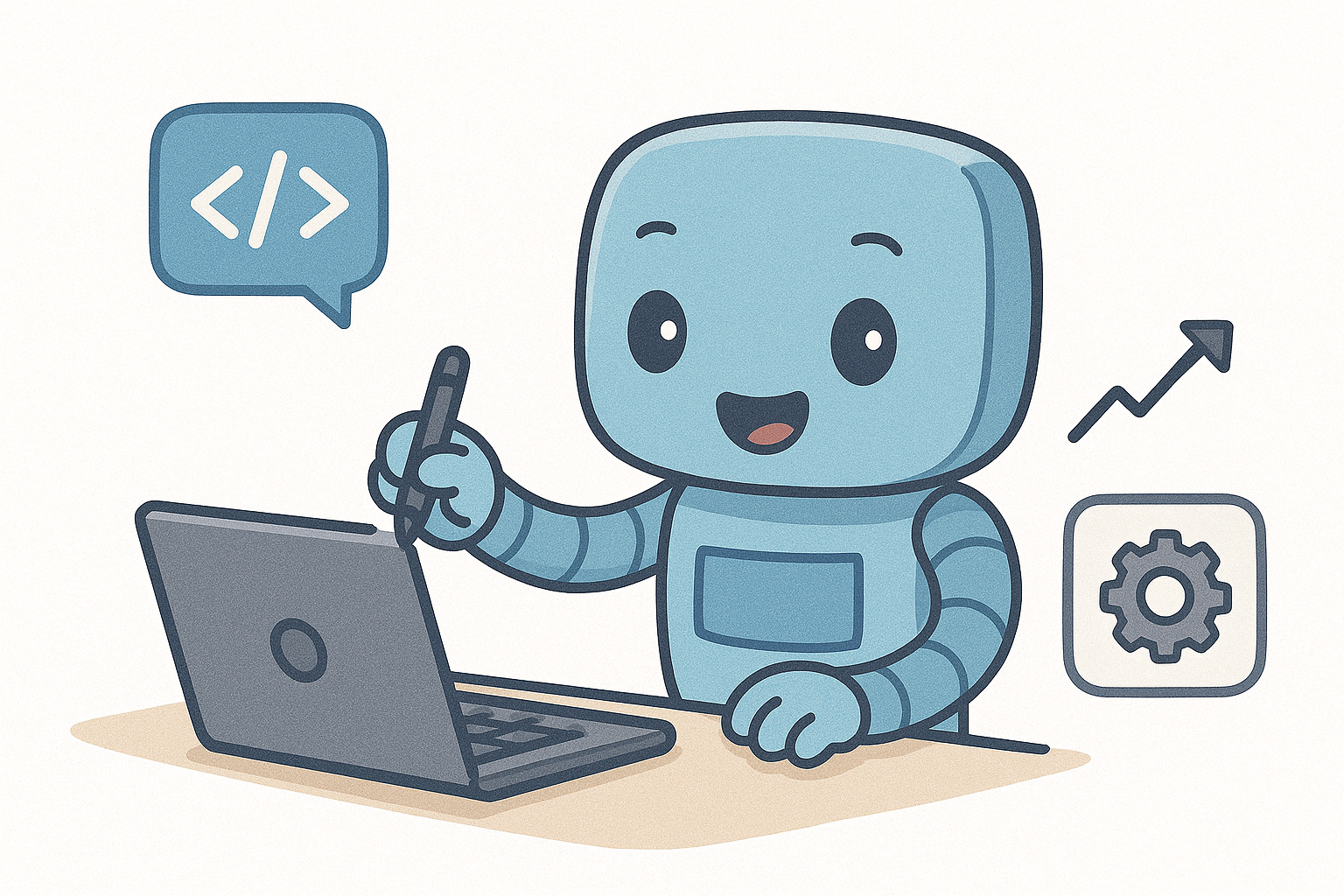
AI Dev Tools Zoomcamp 2025 6-week program on integrating AI into developer workflows, including coding assistants (GitHub Copilot, Cursor), Model Context Protocol (MCP), custom AI agents with Django, and no-code automation with n8n
| Level | Beginner to Intermediate |
| Duration | 6-week live cohort or self-paced anytime |
| Cost | Free |
| Certificate | Yes, after completing a project and peer reviews |
| Prerequisites | Basic programming (Python/JavaScript), no AI required |
| Key topics covered | AI assistants, agents, MCP, automation, DevOps integration |
| Tools/tech stack | GitHub Copilot, Cursor, MCP, Django, FastAPI, n8n, React |
| Who it's for | Developers and engineers who want to explore how AI tools fit into their workflow, boost productivity with coding assistants, agents, and automation, and prefer project-based practice over theory-heavy tutorials |
| Projects | AI-powered development toolkit with assistants & agents |
| Outcomes | Hands-on experience building complete projects with AI tools and a portfolio demonstrating practical skills in applying AI to engineering work |
| Next start date | New cohort starts every November |
AI Dev Tools Zoomcamp is a free course on using AI for developer workflows. Over six weeks, you’ll go from experimenting with AI coding assistants to creating your own agent that scaffolds real applications.
The course covers the AI tool landscape (ChatGPT, Copilot, Cursor), teaches you to build end-to-end projects with React/TypeScript and FastAPI backends, introduces the Model Context Protocol (MCP) for connecting AI to GitHub and databases, and shows you how to build custom coding agents with Django. You’ll also learn to apply AI across the development lifecycle—from automated testing and PR reviews to CI/CD integration and no-code automation with n8n.
Analytics in Stock Markets Zoomcamp
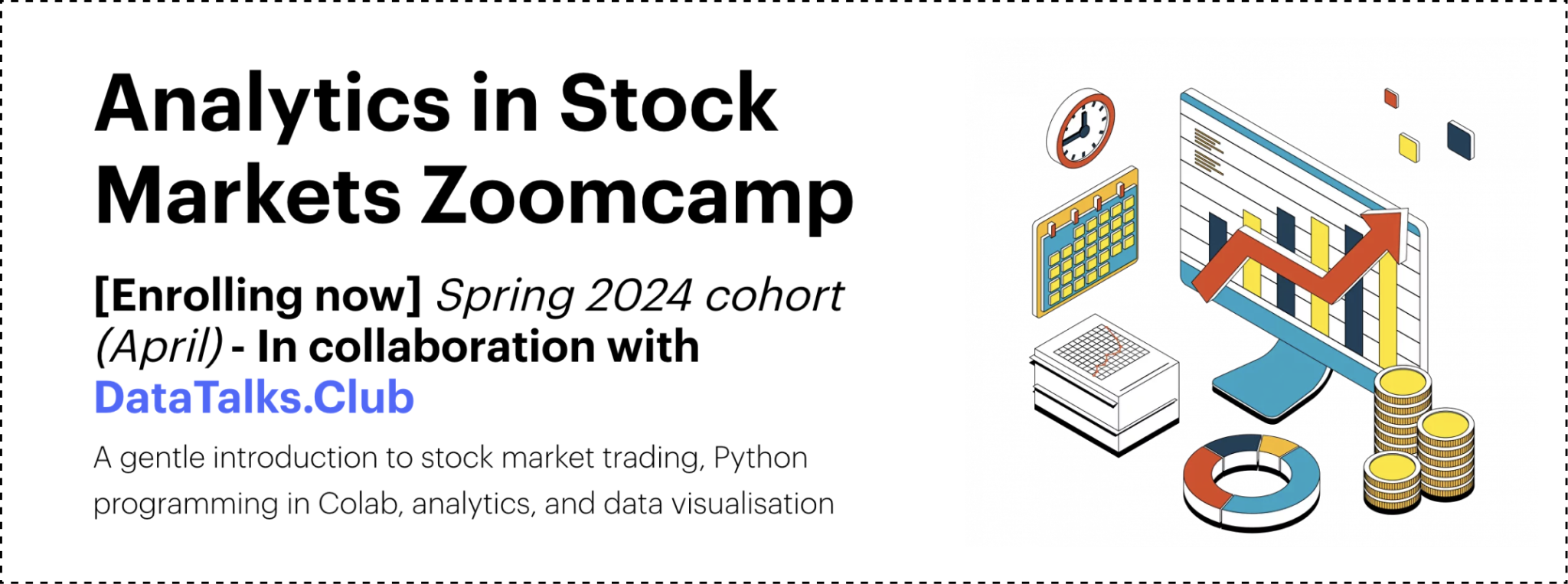
Analytics in Stock Markets Zoomcamp 8-week data science program on financial markets, covering Python-based analysis with Pandas and NumPy, trading strategy development, backtesting, and building automated trading systems
| Level | Beginner to Intermediate |
| Duration | 8-week live cohort or self-paced anytime |
| Cost | Free |
| Certificate | Yes, after completing a project and peer reviews |
| Prerequisites | Basic Python, analytical mindset, interest in finance |
| Key topics covered | Financial data, modeling, trading strategies, automation |
| Tools/tech stack | Python, Pandas, NumPy, financial APIs, trading frameworks |
| Who it's for | Python developers and data enthusiasts interested in financial markets, trading strategies, and building automated trading systems |
| Projects | Trading system that generates predictions & executes trades |
| Outcomes | Hands-on experience with financial data analysis, trading strategy development, and building a semi-automatic trading system |
| Next start date | New cohort starts every April |
Analytics in Stock Markets Zoomcamp is a free data science course that covers data-driven decision-making, using popular Python libraries to work with financial data from data types and cleaning to hypothesis testing and making predictions.
You’ll learn to work with financial APIs, analyze market data using Pandas and NumPy, develop and backtest trading strategies, and build predictive models for stock market movements. You’ll also build a semi-automatic trading system that systematically generates predictions and executes trades, giving you hands-on experience with financial data analysis, risk management, and algorithmic trading concepts.
Which Course Should You Choose?
Choosing the right Zoomcamp depends on your background, career goals, and the kind of systems you want to build. All courses are project-based and free, but each one develops a different skill set.
If you’re new to the field and want a broad, practical entry point
Choose between Machine Learning Zoomcamp and Data Engineering Zoomcamp:
- Machine Learning Zoomcamp: you’ll learn hands-on ML engineering experience, from models to deployment
- Data Engineering Zoomcamp: you’ll learn to work with data pipelines, warehouses, batch/streaming, and infrastructure
If you’re already working with data or ML and want to advance your skills
Choose between MLOps Zoomcamp and LLM Zoomcamp:
- MLOps Zoomcamp: you’ll learn to productionize ML models and learn experiment tracking, orchestration, CI/CD, and monitoring
- LLM Zoomcamp: you’ll learn to build AI applications powered by large language models, using RAG, vector search, evaluation, and agents
If you’re a developer looking to add AI to your workflow
Choose AI Dev Tools Zoomcamp: you’ll learn to use AI coding assistants, integrate MCP, build agents, and automate development tasks
If you’re interested in financial data and trading systems
Choose Analytics in Stock Markets Zoomcamp: you’ll learn to analyze markets, test strategies, and build semi-automatic trading systems
If you’re unsure where to start
If you’re unsure where to start, use this heuristic:
- Want to work with models? → ML Zoomcamp
- Want to work with data pipelines? → DE Zoomcamp
- Want to operationalize models and run ML in production? → MLOps Zoomcamp
- Want to build with LLMs and AI tools? → LLM or AI Dev Tools Zoomcamp
You can also start with one course in self-paced mode and join a live cohort later. Many learners complete multiple Zoomcamps as they grow in their careers.
DTC Zoomcamps vs. Bootcamps
DataTalks.Club Zoomcamps offer a different model compared to traditional tech bootcamps. Both aim to teach practical, job-relevant skills, but the structure, cost, and learning approach vary significantly.
| Category | Zoomcamps | Bootcamps |
|---|---|---|
| Cost | Completely free. No upsells, no paid tiers, no expiring access | Typically $2,000-$12,000+, sometimes with financing or income-share agreements |
| Format | • Pre-recorded lectures on YouTube • Open-source materials on GitHub • Self-paced or live cohort options • Weekly deadlines only in cohort mode |
• Live classes, fixed schedules • Limited access to materials after graduation • Less flexibility for people working full-time |
| Curriculum | • Deep focus on building real, production-ready systems • Tools directly used in industry (Docker, dbt, Spark, FastAPI, Kubernetes, etc.) • Course content updated yearly by the community |
• Often broader but shallower • Less emphasis on production infrastructure • Content quality varies widely by provider |
| Portfolio & Projects | • Capstone projects designed to simulate real engineering tasks • Peer review and community feedback • Projects remain fully yours and live on GitHub |
• Projects usually smaller, more guided • Often not production-grade |
| Community | • Large, active Slack community (80k+) • Weekly discussions, Q&A bots, and peer support • Contributions from real practitioners |
• Smaller cohort-based communities • Some vanish after graduation |
| Certificates | Free certificates available only after real project completion | Certificate included but not always backed by strong practical projects |
What Students Say About the Zoomcamps
Machine Learning Zoomcamp was exhaustive, with comprehensive content that covered concepts in depth. You can learn everything from the simplest concepts to preparing and deploying an ML model for production. Additionally, the community behind this course is highly participative and collaborative. I would like to thank Alexey Grigorev for all the knowledge he shared with us and his team for providing the support we needed to solve each problem we faced.
— Alexander Daniel Rios, ML Zoomcamp course graduate (Source)
Machine Learning Zoomcamp has been an incredible journey, thanks to the expert guidance of Alexey Grigorev. I’m thankful for this programme, which provided challenging coursework that is taught in a very structured and lucid way. The assignments & hands-on projects instill a sense of delivery, besides equipping us with practical acumen to solve real-life problems.
— Siddhartha Gogoi, ML Zoomcamp course graduate (Source)
Thank you for what you do! The Data Engineering Zoomcamp gave me skills that helped me land my first tech job.
— Tim Claytor, Data Engineering Zoomcamp course graduate (Source)
Three months might seem like a long time, but the growth and learning during this period are truly remarkable. It was a great experience with a lot of learning, connecting with like-minded people from all around the world, and having fun. I must admit, this was really hard. But the feeling of accomplishment and learning made it all worthwhile. And I would do it again!
— Nevenka Lukic, Data Engineering Zoomcamp course graduate (Source)
Such a fun deep dive into data engineering, cloud automation, and orchestration. I learned so much along the way. Big shoutout to Alexey Grigorev and the DataTalksClub team for the opportunity and guidance throughout the 3 months of the free course.
— Assitan NIARE, Data Engineering Zoomcamp course graduate (Source)
If you’re serious about breaking into data engineering, start here. The repo’s structure, community, and hands-on focus make it unparalleled.
— Wady Osama, Data Engineering Zoomcamp course graduate (Source)
Frequently Asked Questions
Zoomcamp is a term that originated from Alexey Grigorev, the founder of DataTalks.Club. It started with his book “ML Bookcamp.” When Alexey decided to create a video course based on the book, he called it “Machine Learning Zoomcamp” - a free, cohort-based course in video format. The name “zoomcamp” is a play on “bookcamp,” referring to the video format of the course. The Zoomcamp series has since expanded to include other free courses like the Data Engineering Zoomcamp, MLOps Zoomcamp, and LLM Zoomcamp, all following the same community-driven, open-source philosophy.
Yes. All DataTalks.Club courses (Zoomcamps) are completely free. You get full access to the GitHub repositories, YouTube playlists, homework, and the Slack community without paying anything. The only investment required is your time and commitment.
No. All lectures are pre-recorded and available on YouTube, so you can watch them whenever you like. Occasionally, optional live workshops or Q&A sessions are announced in Slack and the newsletter, but they are not required to complete the course.
Certificates are available only during live cohorts. To earn one, you need to complete the required project(s) and review other students’ submissions before the deadlines. Self-paced learners have full access to the course but are not eligible for certificates.
Certificates are not formally accredited, but they validate that you completed a real project using modern tools. Your GitHub portfolio and project work carry the most weight—many learners use their Zoomcamp projects to showcase practical skills in job applications.
For a live cohort, plan for around 10-15 hours per week to watch lectures, complete homework, and work on the project. Self-paced learners can adjust the workload to their schedule, but more weekly time generally leads to better progress and outcomes.
Python is the main programming language used across all Zoomcamps. The exact skill level depends on the course—each course section in this guide lists its prerequisites.
Zoomcamps offer a similar project-based, structured learning experience but are completely free and open source. Bootcamps charge between $2,000 and $10,000+, often restrict access to materials, and follow strict schedules. Zoomcamps are flexible and community-driven—no content paywalls, no time limits, and no tuition fees.
You can request an invite via the Slack signup form. After confirming your email, you’ll receive an invitation link. Slack is where discussions happen, questions are answered, and announcements for cohorts and workshops are posted.